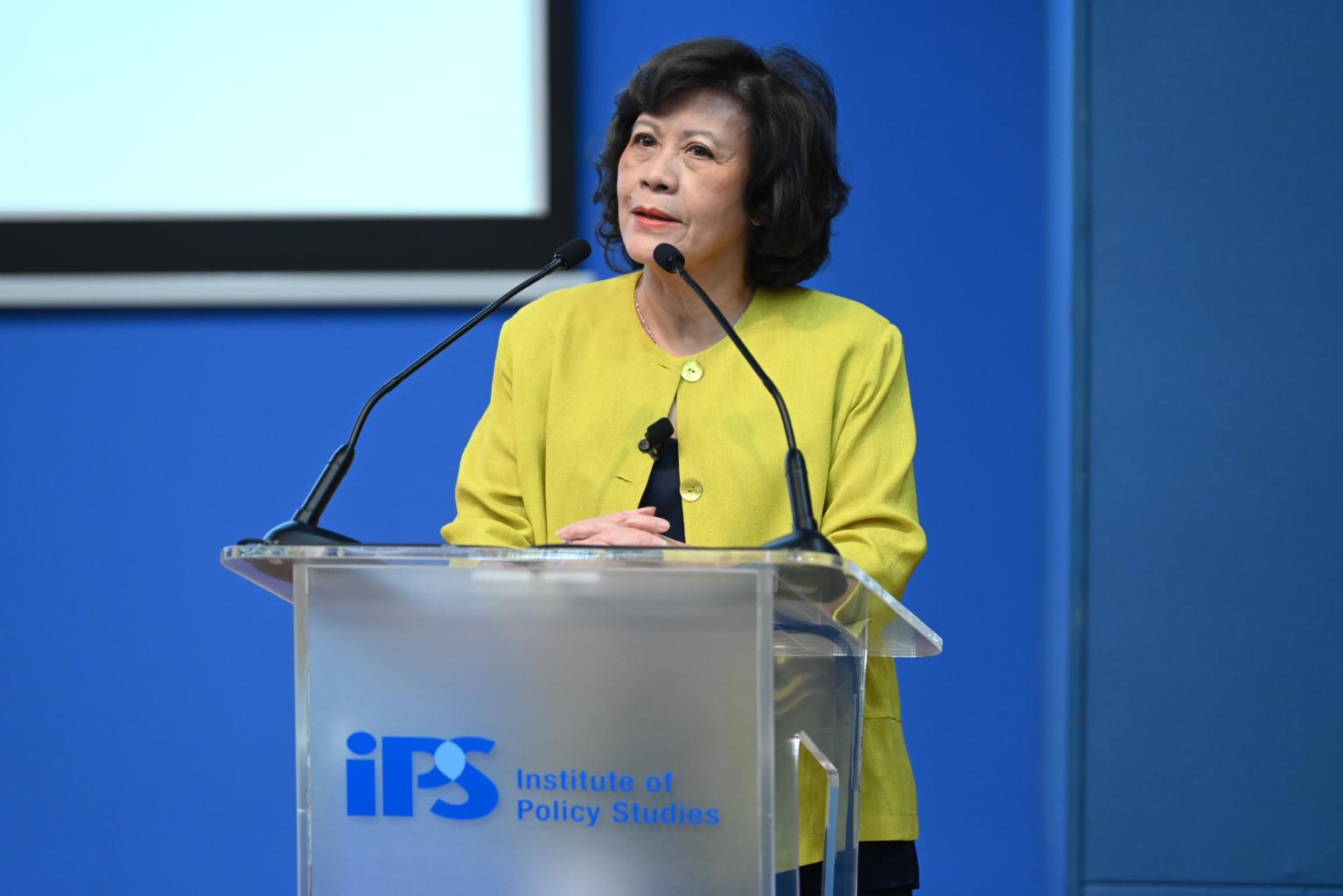Singapore can contribute to world by being hub for global public health, cyber security, sustainability: Noeleen Heyzer
Sign up now: Get ST's newsletters delivered to your inbox

Dr Noeleen Heyzer speaking at her lecture series on Singapore and Multilateral Governance: Securing Our Future on Dec 10, 2021.
PHOTO: INSTITUTE OF POLICY STUDIES
Follow topic:
SINGAPORE - Being a hub for global public health is one way Singapore can contribute to the larger well-being of people and the planet, said social scientist Noeleen Heyzer on Friday (Dec 10).
The Republic can also take the lead in helping the world by becoming a digital hub for cyber security and a financial hub that plays a role in financing projects that reduce or remove carbon emissions.
Dr Heyzer was speaking at the third and final session of her lecture series on Singapore and Multilateral Governance: Securing Our Future, which is under the Institute of Policy Studies-Nathan Lecture Series.
She spoke on the need for renewed multilateral governance that has to evolve with the changes around the world.
Dr Heyzer, a former under-secretary-general of the United Nations, was also the 10th person to be appointed by the Institute of Policy Studies (IPS) as an S R Nathan Fellow for the Study of Singapore.
Previous fellows include Professor Chan Heng Chee, Ambassador-at-Large at the Ministry of Foreign Affairs, who moderated Friday's question-and-answer segment, and Banyan Tree chairman Ho Kwon Ping.
Dr Heyzer noted that Singapore has been playing an important role in global health security during the Covid-19 pandemic.
She said: "It can now be more ambitious and become a hub for global public health in three ways: linking public health to environmental health, improving health equity in healthcare delivery, and taking advantage of frontier healthcare technology."
On the topic of cyber security, she noted that the adoption of 5G will broaden the cyber attack surface.
She called for industry groups to take a lead in developing and harmonising best practices in cyber security.
She also highlighted the significant gender gap in cyber security, which has resulted in a lack of gender perspectives informing the issue and the development of frameworks that fail to identify and respond to cyberthreats faced by women and girls.
Singapore could look into a gender analysis of the norms on responsible state behaviour in cyberspace, which could provide guidelines for a more gender-aware approach to their implementation, and accelerate efforts to eliminate harassment and crimes in the cyberworld, said Dr Heyzer.
In terms of sustainability, Singapore can play a strong role in wealth planning solutions that support sustainable development in Asia, she said.
She noted that there is good potential for South-east Asia to generate carbon credits, and Singapore can play a role in the financing of projects that reduce or remove emissions through these credits.
A carbon credit is a permit which allows a country or organisation to produce a certain amount of carbon emissions and which can be traded if the full allowance is not used.
Given the unpredictability of the future, the world must act as a true global community, for the sake of its collective future.
"Singapore must not only be part of this global community, we must also lead the way with sincerity and solidarity," Dr Heyzer said.
She added: "Singapore can become a locally rooted nation with strong principles aligned with multilateral governance, with a secure national core, but increasingly comfortable with being a global citizen with the rights and responsibilities of what that entails.
"We could move from being identified as a little red dot to a beacon of smart and compassionate power, regionally and globally where our citizens can be counted on to revitalise multilateral governance. That is a future worth securing."
She noted the complexities of governing the global commons - shared natural or cultural resources - and global public goods, such as a healthy planet and peace and security.
She said any effort at improving their governance and to manage the risks in doing so must navigate the complexities and seek explicitly to incorporate new approaches where they are likely to deliver better outcomes.
"(This) means all global stakeholders realising that solidarity is self-interest and taking greater collective responsibility for managing the global commons and global public goods, and the great disruptions of the 21st century.
"These are issues that no country can address alone. They require the concerted resolve of all stakeholders working together - governments, cities, corporations, civil society, and even private citizens."

